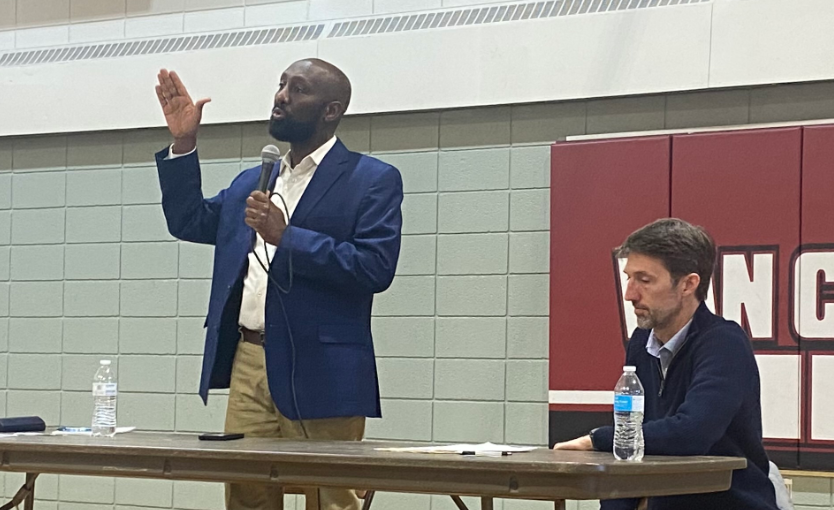Sen. Doron Clark (DFL-Minneapolis) and Rep. Mohamud Noor (DFL-Minneapolis) met with residents for a town hall meeting discussing housing affordability, public safety and protecting international students on Saturday.
Minneapolis residents met with Noor and Clark at Van Cleve Recreation Center and submitted questions to the two legislators. Clark recently became the senator for District 60B, which covers most of the University of Minnesota area, after the passing of former Sen. Kari Dziedzic.
With a University international student recently detained and five students at Minnesota State University, Mankato having their visas terminated, Clark and Noor addressed questions about protecting University of Minnesota students from Immigration and Customs Enforcement efforts.
“The way that we should ensure that our students are at the University of Minnesota is that they all feel welcome, and whether that is how you identify, whether that is you’re from across our diverse spectrum of folks, you should be treated with quality and equity,” Clark said. “That’s my expectation, and that’s what I would be encouraging the University.”
Noor echoed Clark’s thoughts and said the University is under attack not only by ICE’s actions but by the federal government’s actions to cut funding from the University.
“It’s not just attacking the University, it’s attacking jobs, it’s attacking our long-term excellence,” Noor said. “We’ve lived around the University of Minnesota to know the value of it, and we need to help ensure that the University stays here, stays strong.”
Addressing public safety around campus, Noor said Minneapolis and University police have made strides to improve safety around campus through the Off-Campus Safety Center in Dinkytown and expanding their coverage beyond traditional University boundaries. He added that it is necessary to recognize that students are impacted by crime outside University boundaries, too.
“We are asking the University to take the lead in some several efforts in terms of the safety of the students because they are separate from the city of Minneapolis,” Noor said. “But guess what? Whatever happens in Como happens in the University, whatever happens in Prospect Park, that impacts the students.”
Clark said that although crime around the University area has decreased about 49% over the past year, the perceptions of crime have not changed for students and residents. He added that the city and state need to continue prevention efforts like the Off-Campus Safety Center.
Residents also asked the legislators if they plan to protect free universal school lunches as a current bill moves through the House and Senate to restrict free meals to families who make below 500% of the federal poverty line. Both Clark and Noor said they support the current free school meals policy now and going forward.
Residents also raised questions about how the Yes to Homes legislative agenda, which would allow for more high-density housing construction and remove some zoning regulations, could impact rent affordability. Clark said the agenda makes housing more affordable and easier to build in and outside Minneapolis.
While Clark promoted the agenda, he added that it does nothing to address rent prices and rising property taxes. He said he is carrying a bill in the Senate to create more affordable options in the city.
“I’m carrying the strengthening main street bill in the Senate,” Clark said. “Which essentially makes it, wherever there’s commercial space, there can be residential on top of it.”
Noor highlighted that people are struggling to find affordable living options across the state, especially families wanting to move into single-family homes in Minneapolis. Noor added that around 50% of renters in the state use over 30% of their income to pay for rent.
“Is not easy for a small family that wants to move to Minneapolis to find affordable housing or home ownership,” Noor said. “We need to address this spectra for those who are homeless to homeownership. There is no between. If we cannot address that right now, we will continue to struggle with high rents.”














